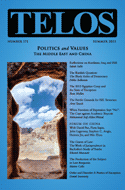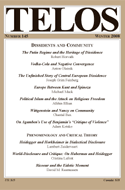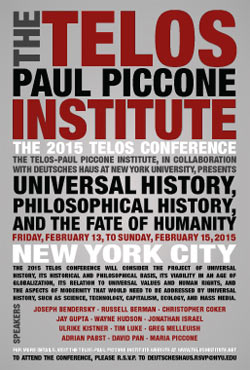By Russell A. Berman · Monday, June 15, 2015 Telos 171 (Summer 2015) is now available for purchase in our store.
 Standard accounts of American politics invoke an oscillation between idealist and realist inclinations. The idealists appeal to principles, which they identify as fundamental to the American polity, especially those enshrined in the founding documents: life, liberty, and the pursuit of happiness, transformed into a broad democratization agenda. Of course, revisionist critics have no difficulty in pointing out the failure of that agenda, i.e., the extent to which the empirical history of the country fell far short of realizing its ideals. Yet even that critique, smugly put forward to debunk naïve idealism, in some basic ways is itself indebted to the same idealism, insofar as the complaint of insufficient democratization also implies a call for more democracy, the very core of the idealist program. This is why neo-conservatives and their left-liberal adversaries always had more in common than met the eye (as was abundantly clear to traditional conservatives). Standard accounts of American politics invoke an oscillation between idealist and realist inclinations. The idealists appeal to principles, which they identify as fundamental to the American polity, especially those enshrined in the founding documents: life, liberty, and the pursuit of happiness, transformed into a broad democratization agenda. Of course, revisionist critics have no difficulty in pointing out the failure of that agenda, i.e., the extent to which the empirical history of the country fell far short of realizing its ideals. Yet even that critique, smugly put forward to debunk naïve idealism, in some basic ways is itself indebted to the same idealism, insofar as the complaint of insufficient democratization also implies a call for more democracy, the very core of the idealist program. This is why neo-conservatives and their left-liberal adversaries always had more in common than met the eye (as was abundantly clear to traditional conservatives).
Continue reading →
By Arno Tausch · Tuesday, May 19, 2015  Die Einsamkeit Israels: Zionismus, die israelische Linke und die iranische Bedrohung (Israel’s Solitude: Zionism, the Israeli Left, and the Iranian Threat), by the German political scientist Stephan Grigat, is an important contribution to the overall debate on the Middle East, and it was published just in time, given the background of the Lausanne negotiations with Iran. Grigat dispels the current euphoria about the “breakthrough in Lausanne” and illuminates the many existing darker sides of the Lausanne deal. The present reviewer is of the opinion that, particularly in view of the special historical responsibility of Continental Europe, a careful reconsideration of the realities created in Lausanne and the considerable role played by the EU foreign policy machinery is necessary and that the other side in the conflict—the side of Israel—is also being heard. Die Einsamkeit Israels: Zionismus, die israelische Linke und die iranische Bedrohung (Israel’s Solitude: Zionism, the Israeli Left, and the Iranian Threat), by the German political scientist Stephan Grigat, is an important contribution to the overall debate on the Middle East, and it was published just in time, given the background of the Lausanne negotiations with Iran. Grigat dispels the current euphoria about the “breakthrough in Lausanne” and illuminates the many existing darker sides of the Lausanne deal. The present reviewer is of the opinion that, particularly in view of the special historical responsibility of Continental Europe, a careful reconsideration of the realities created in Lausanne and the considerable role played by the EU foreign policy machinery is necessary and that the other side in the conflict—the side of Israel—is also being heard.
Continue reading →
By Telos Press · Monday, May 4, 2015
Beyond Nostalgia:
Ethics, Politics, and the Critique of Modernity
January 15–16, 2016
New York, NY
On January 15–16, 2016, the Telos-Paul Piccone Institute will hold its annual conference in New York City. The theme of the conference will be “Beyond Nostalgia: Ethics, Politics, and the Critique of Modernity.” If you wish to participate in the conference, please send an abstract (no more than 250 words) and short c.v. to telosnyc@telosinstitute.net by August 15, 2015, and place “The 2016 Telos Conference” in the email’s subject line.
Continue reading →
By Lewis West · Tuesday, April 21, 2015  In her exploration of Wittgenstein’s elusive and scattered commentary on community, Chantal Bax notes the absence of an explicit understanding of community in the philosopher’s work. Though Wittgenstein often invokes communal concepts, he rarely provides any details regarding the exact nature of a proper community, or the maintenance and governance a just society requires. Bax highlights the one place where Wittgenstein succumbs to the “unfortunate metaphor” of the body politic: he suggests the Jews, marginalized by European society, resemble a “‘kind of disease, anomaly,'” a “‘swelling'” which can “‘only be considered to be a proper part of the body when the whole feeling for the body is changed'” (105). Bax reads this as a tragic and empathetic lament: Wittgenstein doubts the possibility of a renewed, welcoming society that nonetheless adheres to this same vocabulary of the political body. And it is this prophetic doubt that intensifies the crisis of community that reiterates the necessity of Wittgenstein’s rethinking of life together. In her exploration of Wittgenstein’s elusive and scattered commentary on community, Chantal Bax notes the absence of an explicit understanding of community in the philosopher’s work. Though Wittgenstein often invokes communal concepts, he rarely provides any details regarding the exact nature of a proper community, or the maintenance and governance a just society requires. Bax highlights the one place where Wittgenstein succumbs to the “unfortunate metaphor” of the body politic: he suggests the Jews, marginalized by European society, resemble a “‘kind of disease, anomaly,'” a “‘swelling'” which can “‘only be considered to be a proper part of the body when the whole feeling for the body is changed'” (105). Bax reads this as a tragic and empathetic lament: Wittgenstein doubts the possibility of a renewed, welcoming society that nonetheless adheres to this same vocabulary of the political body. And it is this prophetic doubt that intensifies the crisis of community that reiterates the necessity of Wittgenstein’s rethinking of life together.
Continue reading →
By Telos Press · Monday, April 20, 2015 Writing at the Daily Beast, Joel Kotkin examines how the drought in California reflects the broader social and economic transformation of the state—and why current political policies that inhibit growth are to blame. Kotkin is the author The New Class Conflict, published by Telos Press Publishing and available for purchase in our store.
Continue reading →
By Jay A. Gupta · Monday, March 30, 2015  Hegel’s lectures on the philosophy of history chart the development of free, reflective self-conscious selves, but what exactly does that mean? For skeptics, it doesn’t mean much, as Hegel notoriously appears to ground this development in the development of the state. This has inspired Popper’s well-known accusations that Hegel was a puppet of the Prussian monarchy, the “enemy of the open society,” etc., etc., and that the “free” subjects of the state as Hegel describes it are anything but. Further, from Marx to Habermas, Hegel is indicted as one who adopts a quietist attitude of priestly monasticism, so while those imbued with the proper critical, historical consciousness are busy trying to change the world according to the dictates of one or another praxis philosophy, Hegel is content to contemplate it as it goes up in flames. Habermas sees in Hegel’s mature work a “blunting of critique” and a “stoic retreat” from the problems of modernity, the very ones that Habermas believes the younger Hegel so incisively diagnosed. Hegel’s lectures on the philosophy of history chart the development of free, reflective self-conscious selves, but what exactly does that mean? For skeptics, it doesn’t mean much, as Hegel notoriously appears to ground this development in the development of the state. This has inspired Popper’s well-known accusations that Hegel was a puppet of the Prussian monarchy, the “enemy of the open society,” etc., etc., and that the “free” subjects of the state as Hegel describes it are anything but. Further, from Marx to Habermas, Hegel is indicted as one who adopts a quietist attitude of priestly monasticism, so while those imbued with the proper critical, historical consciousness are busy trying to change the world according to the dictates of one or another praxis philosophy, Hegel is content to contemplate it as it goes up in flames. Habermas sees in Hegel’s mature work a “blunting of critique” and a “stoic retreat” from the problems of modernity, the very ones that Habermas believes the younger Hegel so incisively diagnosed.
Continue reading →
|
|
 Standard accounts of American politics invoke an oscillation between idealist and realist inclinations. The idealists appeal to principles, which they identify as fundamental to the American polity, especially those enshrined in the founding documents: life, liberty, and the pursuit of happiness, transformed into a broad democratization agenda. Of course, revisionist critics have no difficulty in pointing out the failure of that agenda, i.e., the extent to which the empirical history of the country fell far short of realizing its ideals. Yet even that critique, smugly put forward to debunk naïve idealism, in some basic ways is itself indebted to the same idealism, insofar as the complaint of insufficient democratization also implies a call for more democracy, the very core of the idealist program. This is why neo-conservatives and their left-liberal adversaries always had more in common than met the eye (as was abundantly clear to traditional conservatives).
Standard accounts of American politics invoke an oscillation between idealist and realist inclinations. The idealists appeal to principles, which they identify as fundamental to the American polity, especially those enshrined in the founding documents: life, liberty, and the pursuit of happiness, transformed into a broad democratization agenda. Of course, revisionist critics have no difficulty in pointing out the failure of that agenda, i.e., the extent to which the empirical history of the country fell far short of realizing its ideals. Yet even that critique, smugly put forward to debunk naïve idealism, in some basic ways is itself indebted to the same idealism, insofar as the complaint of insufficient democratization also implies a call for more democracy, the very core of the idealist program. This is why neo-conservatives and their left-liberal adversaries always had more in common than met the eye (as was abundantly clear to traditional conservatives).  Die Einsamkeit Israels: Zionismus, die israelische Linke und die iranische Bedrohung (Israel’s Solitude: Zionism, the Israeli Left, and the Iranian Threat), by the German political scientist Stephan Grigat, is an important contribution to the overall debate on the Middle East, and it was published just in time, given the background of the Lausanne negotiations with Iran. Grigat dispels the current euphoria about the “breakthrough in Lausanne” and illuminates the many existing darker sides of the Lausanne deal. The present reviewer is of the opinion that, particularly in view of the special historical responsibility of Continental Europe, a careful reconsideration of the realities created in Lausanne and the considerable role played by the EU foreign policy machinery is necessary and that the other side in the conflict—the side of Israel—is also being heard.
Die Einsamkeit Israels: Zionismus, die israelische Linke und die iranische Bedrohung (Israel’s Solitude: Zionism, the Israeli Left, and the Iranian Threat), by the German political scientist Stephan Grigat, is an important contribution to the overall debate on the Middle East, and it was published just in time, given the background of the Lausanne negotiations with Iran. Grigat dispels the current euphoria about the “breakthrough in Lausanne” and illuminates the many existing darker sides of the Lausanne deal. The present reviewer is of the opinion that, particularly in view of the special historical responsibility of Continental Europe, a careful reconsideration of the realities created in Lausanne and the considerable role played by the EU foreign policy machinery is necessary and that the other side in the conflict—the side of Israel—is also being heard.  In her exploration of Wittgenstein’s elusive and scattered commentary on community, Chantal Bax notes the absence of an explicit understanding of community in the philosopher’s work. Though Wittgenstein often invokes communal concepts, he rarely provides any details regarding the exact nature of a proper community, or the maintenance and governance a just society requires. Bax highlights the one place where Wittgenstein succumbs to the “unfortunate metaphor” of the body politic: he suggests the Jews, marginalized by European society, resemble a “‘kind of disease, anomaly,'” a “‘swelling'” which can “‘only be considered to be a proper part of the body when the whole feeling for the body is changed'” (105). Bax reads this as a tragic and empathetic lament: Wittgenstein doubts the possibility of a renewed, welcoming society that nonetheless adheres to this same vocabulary of the political body. And it is this prophetic doubt that intensifies the crisis of community that reiterates the necessity of Wittgenstein’s rethinking of life together.
In her exploration of Wittgenstein’s elusive and scattered commentary on community, Chantal Bax notes the absence of an explicit understanding of community in the philosopher’s work. Though Wittgenstein often invokes communal concepts, he rarely provides any details regarding the exact nature of a proper community, or the maintenance and governance a just society requires. Bax highlights the one place where Wittgenstein succumbs to the “unfortunate metaphor” of the body politic: he suggests the Jews, marginalized by European society, resemble a “‘kind of disease, anomaly,'” a “‘swelling'” which can “‘only be considered to be a proper part of the body when the whole feeling for the body is changed'” (105). Bax reads this as a tragic and empathetic lament: Wittgenstein doubts the possibility of a renewed, welcoming society that nonetheless adheres to this same vocabulary of the political body. And it is this prophetic doubt that intensifies the crisis of community that reiterates the necessity of Wittgenstein’s rethinking of life together.  Hegel’s lectures on the philosophy of history chart the development of free, reflective self-conscious selves, but what exactly does that mean? For skeptics, it doesn’t mean much, as Hegel notoriously appears to ground this development in the development of the state. This has inspired Popper’s well-known accusations that Hegel was a puppet of the Prussian monarchy, the “enemy of the open society,” etc., etc., and that the “free” subjects of the state as Hegel describes it are anything but. Further, from Marx to Habermas, Hegel is indicted as one who adopts a quietist attitude of priestly monasticism, so while those imbued with the proper critical, historical consciousness are busy trying to change the world according to the dictates of one or another praxis philosophy, Hegel is content to contemplate it as it goes up in flames. Habermas sees in Hegel’s mature work a “blunting of critique” and a “stoic retreat” from the problems of modernity, the very ones that Habermas believes the younger Hegel so incisively diagnosed.
Hegel’s lectures on the philosophy of history chart the development of free, reflective self-conscious selves, but what exactly does that mean? For skeptics, it doesn’t mean much, as Hegel notoriously appears to ground this development in the development of the state. This has inspired Popper’s well-known accusations that Hegel was a puppet of the Prussian monarchy, the “enemy of the open society,” etc., etc., and that the “free” subjects of the state as Hegel describes it are anything but. Further, from Marx to Habermas, Hegel is indicted as one who adopts a quietist attitude of priestly monasticism, so while those imbued with the proper critical, historical consciousness are busy trying to change the world according to the dictates of one or another praxis philosophy, Hegel is content to contemplate it as it goes up in flames. Habermas sees in Hegel’s mature work a “blunting of critique” and a “stoic retreat” from the problems of modernity, the very ones that Habermas believes the younger Hegel so incisively diagnosed. 

